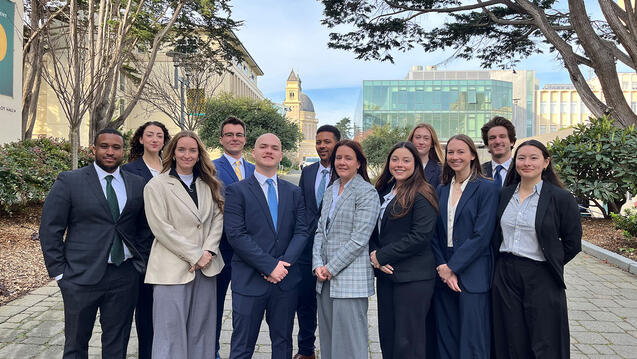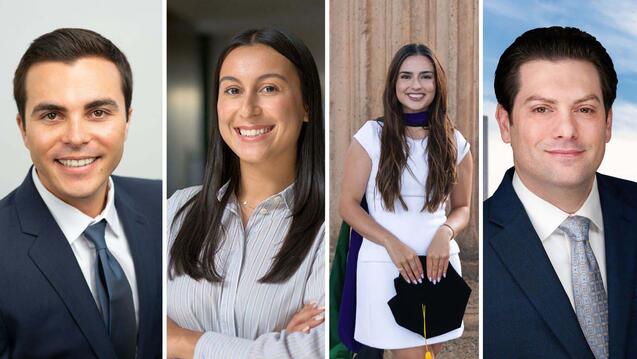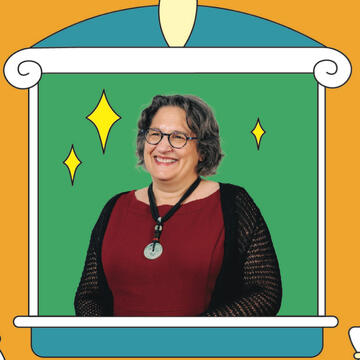
A Legacy of Transformation
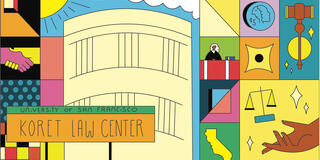

In June 2024, when Susan Freiwald returns to the faculty after six years as dean of the University of San Francisco School of Law, she will leave the institution — and its students — on a firmer foundation than the day she stepped into office. “Susan took the helm as dean during a tumultuous time for the law school,” said Katie Moran ‘16, an alumna of USF Law and co-director of the Academic and Bar Exam Success program. “And she really turned the ship around.” At least in part, Dean Freiwald credits her time in the classroom with instilling in her the student-centered ethos that she brings to her work every day. She notes that the role of dean has many constituencies, but the law school truly belongs to the students and the alumni. “Coming from 20 years on the faculty has guided my leadership and perspective,” said Freiwald. “We’ve been here 100-plus years, we have this glorious history of producing practice-ready lawyers who know how to serve their communities and their clients, and we make a promise to them that we’re going to get them over the bar and into fulfilling jobs that put their legal skills and training to the best use.” Renewing this promise has been the law school’s top priority. Today, students are experiencing the difference — and feeling the excitement — as a result of significant innovations and investment across several areas.
Raising the Bar
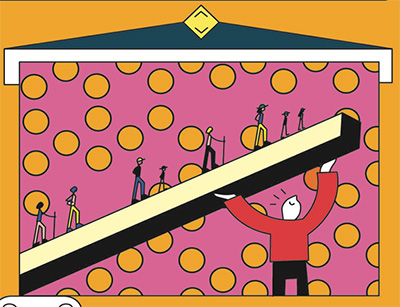
Over the past six years, students have benefited from a comprehensive, top-to-bottom revamp of USF Law’s bar preparation program. From getting the right team in place, to meeting with instructors, sitting down with recent alumni, expanding and adding rigor to existing courses, and spearheading major curricular reforms, Freiwald has implemented an all-hands-on-deck, all-of-the-above strategy. A vital step was launching the Academic and Bar Exam Success program, or ABES. Where many law schools rely on private bar exam preparation programs and instructors, Freiwald redesigned ABES to provide exceptionally rigorous and well-rounded support for every USF graduate who intends to sit for the bar exam. “We treat the students as if they’re big law associates: We tutor them, mentor them, grade them, feed them, put on simulated bar exams, and do everything we can to set them up for success,” said Jonathan Chu, a 23-year veteran of legal academia and co-director of ABES who noted that USF students match the faculty’s passion and commitment with their own. “They’re very motivated. When I get here at nine o’clock in the morning on the very first day of bar prep, the library is already full.” At the center of each programmatic improvement and decision-making process is a newly data-driven approach aimed at continually refining the curriculum and setting graduates up for success — along with an overriding emphasis on finding the most effective ways to serve USF Law’s diverse and highly driven student body. “The law school is very focused, at a cultural level, on building community,” said Freiwald. “The registrar knows your name, the dean of students is ready to meet with you anytime, and we have lots of mentoring from students and alumni who want to give back. If I had a nickel for every time an alum asked me ‘what can I do, how can I help?’.... We are a small community made up of people who care for each other.”
New Centers & Programs
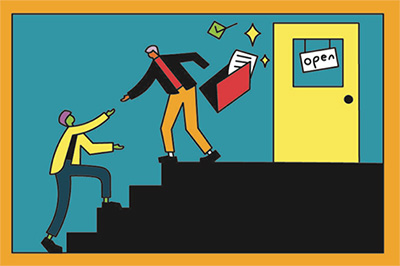
In addition to alumni who give their time, share their expertise, and open their professional networks to students, the USF Law community has supported the school with a great deal more than nickels. From expanding USF’s Racial Justice Clinic by creating two staff attorney positions as part of a landmark partnership with the San Francisco District Attorney’s Office, to funding bar prep resources, generous donors who are alumni and friends are stepping forward to help propel the law school’s programming and reputation. Four years ago, Freiwald secured a gift totaling $6.1 million from an anonymous benefactor to establish a new Justice for Animals Program, which created an endowed Chair in Animal Law, and allowed the law school to recruit renowned animal rights litigator Matthew Liebman. Freiwald has also been successfully raising funds for the construction of a new space in the library that will house the evolving International Human Rights and Immigration Clinics — and, together with her team, has brought two new centers to campus, each focused on a cutting-edge area of law: the Center for Contemplative Law and Ethics, which teaches research-based mindfulness practices to students and lawyers, and the Center for Law, Tech, and Social Good, the first of its kind in the nation. “We’re bringing leaders from the industry, experts from government, real power players in the ecosystem to campus to meet with our students,” said Visiting Professor Michele Neitz, founding director of the Blockchain Law for Social Good Center. “Students have been really eager to learn about this technology, and a lot of them really do come at this from a social good angle because that’s just who USF students are.” By putting on events, providing training sessions for California leaders and policymakers, and conducting research on the implications of blockchain from urban development to climate action to privacy, the Center holds potential to become a differentiator that attracts students while enriching the USF Law experience. “The Center is not just about getting students jobs, it’s also thinking about the right way to regulate this new technology that avoids the mistakes of the past,” said Freiwald. “We can contribute to the development of ethical legal frameworks that incorporate central Jesuit values, which include collaboration rather than unbridled competition, care for the environment, and care for each other.”
Practical Instruction & Hands-on Learning
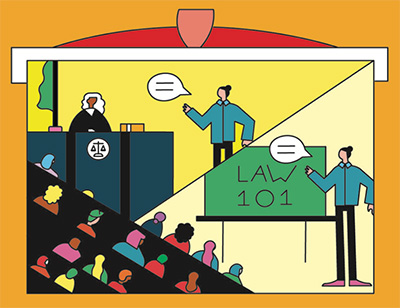
Just as foundational as USF’s deep-seated Jesuit values is the law school’s longtime dedication to experiential learning, enabling students to build practical skills, and helping to connect them with the right job opportunities after graduation. Freiwald has renewed focus on these critical priorities and, under her leadership, USF Law has expanded its mentorship program, launched new guided inhouse externships, and secured the financial support necessary to hire a visiting professor of practice. “We’ve been going back to USF’s core values, devoting time to practical legal education that students really need to succeed,” said USF Law alumna and Associate Dean of Academic Affairs Amy Flynn ‘04. “It goes way beyond what people mean when they talk about traditional lawyering skills. What we’re really trying to do is to make sure USF Law students become lifelong learners, and that they have the mindset to succeed and to overcome adversity.” Taking advantage of its proximity to San Francisco’s thriving legal community and deep well of world-class legal talent, the law school routinely draws a wide array of practitioners, jurists, and experts to campus. The revamped curriculum involves more opportunities for practicing lawyers to impart their knowledge and professional skills to students. “Our adjunct professors are lawyers or even judges who take time from their busy schedules to teach, mentor, and assess our students,” said Freiwald. “Many of them are USF Law alumni who draw upon their real-world experience to train our students to be excellent lawyers and critical thinkers.”
Career Services
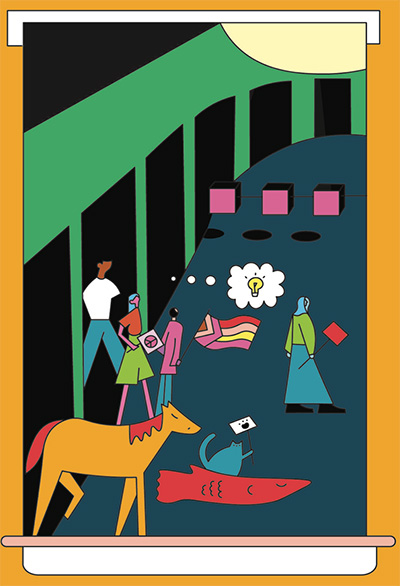
USF Law is committed to helping students and recent graduates navigate a tumultuous legal job market — a task now entrusted to a Career Services Office that Freiwald has revamped and reinvigorated. “The Career Services team are our students’ biggest cheerleaders and supporters, working tirelessly to help connect them with the right opportunities,” said Flynn. “And I think students themselves are excited because the environment is positive and the support is palpable.” It’s common for similar offices at other universities to hold open houses or office hours, perhaps once a week or on an otherwise limited basis. At USF Law, the lights are on, the doors are open, and Career Services counselors are available to meet with students on a full-time basis — and then some. “I know every single one of our counselors has made calls or heard from students after hours, and we’ve all worked weekends, evenings, and over winter break to make things better for each one of our students,” said Adjunct Professor Karren Shorofsky, who has served as director of the Office of Career Services for well over a year. “We have a diverse and extraordinary student body, and the key is to really see and hear those students in all their uniqueness. Their stories are so powerful, and we’re there to help them find that power — and just be a resource for them in any way we can.” With newly converted workspaces for students, a speaker series that helps connect applicants with jobs or internships, and a highly personalized and team-based structure, Career Services has never been better positioned to serve the USF Law community. Along the way, the law school’s engaged and energized alumni have become the office’s greatest asset. “We have an extraordinary alumni mentor program that’s run in conjunction with Alumni Relations, and it provides every single student with the chance to opt in for an alumni mentor every year, said Shorofsky. “Our goal is to have each student feel like they have at least one alum that they can connect with. That student-alumni connection is really powerful, and I think it’s one of the best things about USF.”
With the law school’s foundations stabilized, its community supportively engaged, its campus home to a diverse and growing array of differentiated programs and clinics, and its student enrollment on the rise, there’s no question that this is an exciting time to be at USF Law. After six years as dean, Freiwald is eager to return to the classroom. She looks forward to resuming research in her fast-changing field of privacy and internet law, having enough alone time to read and write, and — most of all — resuming her work directly with USF Law students. “As a professor, I take a lot of pride and pleasure in seeing students grow and develop into lawyers. Law school provides lifelong tools,” said Freiwald. “Helping them to move from not knowing or even confused to actually ‘getting it’ — and then watching them graduate, and keep in touch, and succeed personally and professionally, each in their own way — it’s just incredibly rewarding.”
